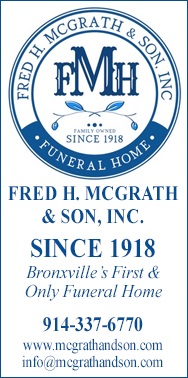From the Mayor: Legal Changes Needed from State to Reduce Property Tax Burden

By Mary C. Marvin
Mar. 2, 2016: This week's column is an addendum to my last column, more local in focus, enumerating the legal changes needed to aid Westchester communities in reducing the property tax burden. All of the following must be advanced by the state legislature and signed by the Governor, as they are not in the purview of local governments.
Traffic Tickets: A frequently misunderstood area of revenue generation is the prosecution by local municipal courts of infractions relating to the violation of state vehicle and traffic laws.
Most residents believe that a speeding ticket, perhaps with a fine of $125.00, immediately contributes to the local coffers. It is quite to the contrary.
A current state law sets the local reimbursement rates on tickets and we are capped at $15.00 per transaction, regardless of the violation or ticket amount, with no provision for inflationary adjustments. As a consequence, $15.00 doesn't come close to covering court expenses, and villages actually lose significant funds handling these cases for the state. When a local police officer pulls you over for speeding, his or her motive is safety only, because the time it takes to issue and adjudicate the ticket is actually a loss for the municipality. The current law needs to be amended so as to more equitably distribute the fine amounts to account for the costs associated with maintaining and operating a local court system. The old adage about it being the end of the month so tickets are issued to increase the coffers is truly a misnomer.
FEMA: For Bronxville, two current state laws will directly and negatively impact us in the coming year as a result of our undertaking the FEMA-backed flood mitigation project.
Since the project is a capital investment, our local financial share is not exempt from the state tax cap legislation. This law must be amended to encourage local governments to undertake infrastructure improvements free of legal constraint, especially in light of the fact it is estimated that New York State infrastructure improvements are underfunded by an astounding 70%.
In tandem with the FEMA construction is the overlay of the Wicks Law. Dating back to 1912, it continues to be one of the most onerous mandates facing local governments. Unlike private construction projects, schools and local governments are required to bid separate plumbing, heating/ventilation/air conditioning, and electrical contracts. This multiple bidding requirement has the effect of increasing costs and delaying projects. Estimates are that the exact same project undertaken by a public entity vs. a private contractor will add 15 to 25 percent to the final cost.
MTA: Another extremely costly set of tax laws particular to Westchester County property taxpayers relates to the MTA. Local municipalities pay both an MTA platform tax and an MTA payroll tax to the State of New York via our town and county taxes. Our Town of Eastchester pays a staggering $1.3 million annually to comply with MTA mandates. It is particularly unfair, because despite the fact that Connecticut residents are a significant percentage of MTA ridership, they pay nothing toward platform maintenance, whereas a property taxpayer in Westchester, who may not even make use of the train system, is shouldering the burden. At the very least, there should be a requirement that the monies are used effectively on actual platform/station maintenance. It is no wonder there is an exodus to adjacent states.
Hotel Occupancy Tax: On another front, Westchester communities, like most communities nationwide, should be allowed to collect a hotel occupancy tax as a user fee to cover additional expenses due to hotel use, most notably police and fire protection. Currently, our neighbors in New Rochelle, Yonkers, Peekskill, Rye City, Rye Brook, and Mamaroneck Village are allowed to collect a tax to cover their extra costs. However, in the last legislative session, a bill to allow Greenburgh, Tarrytown, Tuckahoe, Ardsley, Elmsford, and North Castle to be treated similarly was vetoed without explanation by Governor Cuomo. Westchester communities are seeking uniformity and fairness, as the location of a hotel's boundaries should not be the deciding factor in whether or not this legislation is passed.
The Triborough Amendment: Finally, the Triborough Amendment, unique to New York State and under the umbrella of the Taylor Law, has an extraordinary impact on the finances of local governments.
In essence, the Triborough Amendment to the Taylor Law prohibits a public employer from altering any provision of an expired labor agreement until a new agreement is reached. The effect is automatic and there are mandatory pay increases where a salary step or longevity schedule exists, even though the agreement has expired.
The amendment serves to undermine the collective bargaining process by discouraging unions from offering concessions or givebacks, since as long as no agreement is reached, the terms of the current contract remain in effect. As example, why would a union that is receiving 100% in health care benefits in a contract dating back five years when the cost structure was different be incentivized to come to the bargaining table at a time when employees are now contributing to their health care costs?
In contrast, in the municipal sector of the 49 other states and the private sector nationwide, where collective bargaining has existed for over 60 years under the National Labor Relations Act, no similar obligation is imposed upon employers who are parties to a labor contract.
All of the above legal constraints contribute to the declining population of New York State, as every one of the above laws places an enormous financial burden on the average citizen.
Repeal of any of them would have a direct effect on our local bottom line and the costs that are always passed on to the local taxpayer.
Financial & Legal Assistance Directory
Hymes & Associates, CPA, P.C.
Our firm provides outstanding service to our clients because of our dedication to the three underlying principles of professionalism, responsiveness, and quality.
Listed as one of the 10 largest firms by The Westchester Business Journal, we serve clients throughout the tri-state area. By combining our expertise, experience, and
the energy of our staff, each client receives close, personal and professional attention.
Our high standards, service, and specialized staff spell the difference between our outstanding performance and other firms. We make sure that every client
is served by the expertise of our whole firm.
Hymes & Associates, CPA, P.C.
55 Pondfield Road
Bronxville, NY 10708
914-961-1200
914-961-1715 (Fax)
Website: www.hymescpa.com
Baillie & Hershman
44 Pondfield Road, Suite - 12
Bronxville, N.Y. 10708
Office: 914-337-6300
Matthew W. Kerner, ESQ.
Direct Dial: 914-337-6569
Email: This email address is being protected from spambots. You need JavaScript enabled to view it.
Fax: 914-337-6913
Suzanne M. Bloomer, Esq.
Direct Dial: 914-337-0142
This email address is being protected from spambots. You need JavaScript enabled to view it.
Baillie & Hershman provides comprehensive Real Estate legal services for buyers, sellers, current owners, real estate agents and lenders. We also handle estate planning, including the drafting of wills.
Griffin, Coogan, Sulzer & Horgan, P.C.
Attorneys and Counselors at Law
Griffin, Googan, Sulzer & Horgan, R.C.
Located in Bronxville, New York, Griffin, Coogan, Sulzer & Horgan, P.C. takes great pride in providing our clients with comprehensive, high quality legal services in a responsive manner. The firm concentrates its practice in real estate law with a primary focus on issues relating to real estate tax litigation (also known as tax certiorari), real estate transactions, valuation law, real property taxation and tax planning and real property tax exemption matters throughout New York State.
The firm serves as general counsel for several local cooperatives and represents clients in various issues relating to wills, trusts and estate planning.
51 Pondfield Road
Bronxville, NY 10708
(914) 961-1300
This email address is being protected from spambots. You need JavaScript enabled to view it.
Nobile, Magarian & DiSalvo LLP
We are hardworking and dedicated attorneys who, combined, have more than 150 years of experience delivering quality legal advice. Our cutting edge is our ability to enter both the conference room and the courtroom with strength. Our law firm provides legal representation and counsel for both individual and business clients on issues related to estate planning and administration, real estate law, litigation, and business law. Our practice areas include: Commercial Litigation, Business Law, Real Estate, Wills, Estate Planning, Trusts, Estate Administration, Living Wills, Health Care Proxies, Powers of Attorney, Not For Profits, and Employment Law.
111 Kraft Avenue
Bronxville, NY 10708
914-337-6300
Veneruso, Curto, Schwartz & Curto, LLP
Veneruso, Curto, Schwartz & Curto is dedicated to providing businesses and individuals with exceptional legal services customized to each client's needs and objectives. Practice areas include litigation, real estate, not for profit, wills and estate planning, land use and zoning, business and corporate, cooperative and condominium and real estate tax assessment litigation.
The Hudson Valley Bank Building
35 East Grassy Sprain Road, Suite 400
Yonkers, New York 10710
914-779-1100
Aegis Capital
Steve brings 40 years of investing experience to his role as Senior Managing Director at Aegis Capital Corp., a prominent national securities firm.














